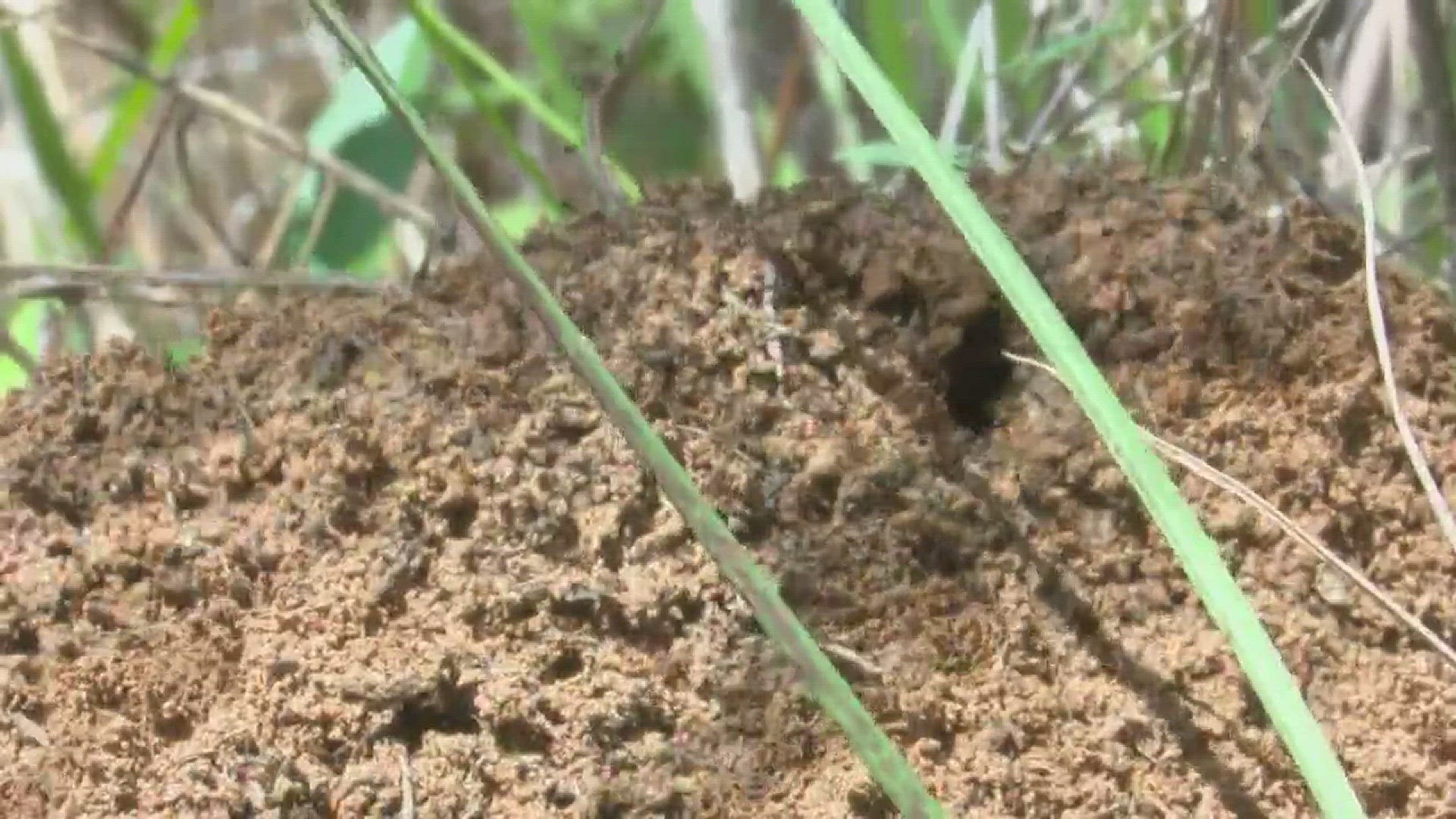If you've noticed a lot of fire ants around town, you are not alone. A KHOU viewer emailed to ask whether this was a particularly bad year for fire ant infestation because he's noticed dozens of mounds popping up in the past few days.
Shawn Stiles, a local branch manager with pest-control company Orkin, says there aren't more fire ants in our area, but Dr. Paul Nester, an entomologist with Texas A&M AgriLife Extension, verified the pests are more active than they've been in recent years.
Houston's mild winter isn't to blame for the uptick in fire ant activity. Dr. Nester credits the rain and humidity. Fire ants love moisture, he says, so much that the tunnels you don't see usually lead to a water source, such as an underground spring or leaky water main.
Because we've had quite a bit of rain, the surface is damp enough that they don't have to live as deep, so they're building more mounds.
"They never went anywhere," Dr. Nester explained. "It's just now we're seeing more of them because they're coming up and doing ant things right now."
Those "ant things" include foraging, reproducing and, possibly, stinging you. That's why many homeowners call pest control companies such as Orkin.
"I do know that fire ants can be pretty aggressive," Stiles said. "It's best to get a professional evaluation done."
That's definitely an option, but you can take care of it yourself. YouTube is full of suggestions, so KHOU decided to run them by the experts before you try them at home.
Solution suggestion No. 1: serving up a helping of grits
"The old story was they eat 'em, and they swell up and die," Dr. Nester said. "No, they don't. A lot of times what happens is people will put grits on top of a mound, the grits will sour and the ants will move over 15 to 20 feet."
He adds that Texas A&M actually studied the use of grits on fire ant mounds and found that, until they sour, they help support the colony.
Solution suggestion No. 2: pouring oil down a mound
"Dumping motor oil in Texas is banned, so that is not a good plan," Dr. Nester said. "The ant itself has to be completely coated with the oil because it breathes with spiracles, then the ant can't breathe."
Other natural oils are sometimes suggested, too, such as tea tree or orange oils. The only way they will work is if the ant gets completely coated and suffocates.
"There is no insecticidal properties with these oils," Dr. Nester said.
Solution suggestion No. 3: lighting a mound oil on fire
Ignoring the fact that pouring gasoline in the ground is illegal in Texas, Dr. Nester says adding a match won't do much to curb your fire ant issues.
"It will burn, but if you kill any ants, the signal goes off, and the ants are escaping that mound and going somewhere else," he said.
Solution suggestion No. 4: pitting one mound's ants against another
This could work for single-queen colonies south of Houston, but fire ants in the Houston area are polygyne, which means each colony has several queens.
"There's no territorial behavior," Dr. Nester said. "All the ants get along, so when you put one mound on the other mound, it's like a family reunion."
Instead of experimenting, he recommends homeowners use what he calls the "Texas Two-Step Method."
"We like the use of fire ant baits twice a year in the spring and fall," Dr. Nester said. "Then we recommend a single-mound treatment for problem mounds."
Whatever you decide to do, just remember the mound is only the tip of the ant iceberg. The rest of the colony is hunkering down far underground.
"If you don't control the queen and immatures, you don't get good ant management," Dr. Nester said
For information about specific brands of bait or insecticide tested by AgriLife Extension Service, tap/click here.
VERIFY: Sources
Steve Stiles, Orkin Branch Manager
Dr. Paul Nester, Texas A&M AgriLife Extension Service Entomologist
Steve Dorman, Harris County Precinct 3 Parks Superintendent
William Hajdik, Sugar Land Director of Parks and Recreation
Steve Smith, KHOU Viewer in Fulshear
VERIFY: Resources
Information on bait/insecticide tested by AgriLife Extension Service: http://fireant.tamu.edu/controlmethods/products/

